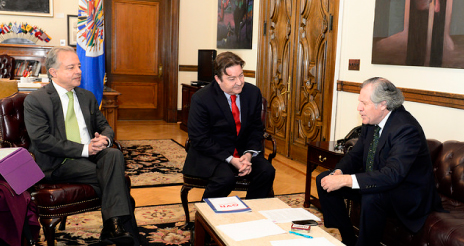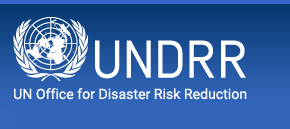- Our Mandate
- Mission and Objectives
- UNDRR in the UN
- Work Programme & Annual Reports
- Results Based System
- Work Partnerships
- Headquarters - Geneva
- SG-UN representatives for DRR
- Regional Office – The Americas and the Caribbean
- Head of the Regional Office – The Americas and the Caribbean
- What is Disaster Risk Reduction?
- What is the International Strategy?
- History of UNDRR
Americas step up Sendai Framework drive
 Mr. Neil McFarlane, Head of UNDRR's New York Liaison Office (centre), discussed the Sendai Framework for Disaster Risk Reduction with Ambassador Luis Almagro, Secretary General of the Organization of American States (right) and Colombian Ambassador Andres Gonzalez Diaz, Chair of the Council of Integral Development (left) at a meeting in Washington on 8 April 2016 (Photo: OAS)
Mr. Neil McFarlane, Head of UNDRR's New York Liaison Office (centre), discussed the Sendai Framework for Disaster Risk Reduction with Ambassador Luis Almagro, Secretary General of the Organization of American States (right) and Colombian Ambassador Andres Gonzalez Diaz, Chair of the Council of Integral Development (left) at a meeting in Washington on 8 April 2016 (Photo: OAS)
WASHINGTON, 11 April 2016 – Paraguay is set to host a key meeting to step up the Americas' drive to implement the Sendai Framework for Disaster Risk Reduction, a global agreement on saving lives and livelihoods from natural and man-made hazards.
The first Ministerial and High Level Authorities Meeting on the Implementation of the Sendai Framework in the Americas is scheduled to take place on 8-9 June in the Paraguayan capital Asunción, delegates heard at a session of the 35-country Organization of American States (OAS) in Washington.
"The Americas region has always been a leader in disaster management, due to a high risk profile and the commitments from the governments to respond effectively and reduce the risks of disasters through better preparation and prevention measures," said Mr. Neil McFarlane, head of UNDRR's office at UN headquarters in New York.
Over 30 percent of the 22,773 deaths recorded worldwide by the Belgium-based Centre for Research on the Epidemiology of Disasters last year from natural hazards were in the Americas, including the loss of 627 lives in landslides in Guatemala. Catastrophes and man-made disasters caused total losses in the region of US$7 billion in Latin America and the Caribbean last year. The main hazards were earthquakes, hurricanes and floods. Winter storms, tornadoes and floods drove insured losses in the United States up to US$17 billion last year.
Mr. McFarlane presented the key features and next steps of the Sendai Framework at the 8 April joint meeting of the Permanent Council and the Inter-American Council for Integral Development of the OAS.
In an address to the meeting, OAS Secretary General Mr. Luis Almagro said that it was "important to reflect on the existing regional mechanisms for disaster management in light of the Sendai Framework".
Adopted a year ago at the Third UN World Conference on Disaster Risk Reduction in Japan, the Sendai Framework is the world's most comprehensive blueprint for curbing the impact of natural and man-made hazards.
The Sendai Framework, which runs to 2030 and links with other global agreements on sustainable development, climate change and development financing, has seven targets. It aims to bring about substantial reductions in disaster deaths, the number of affected people and economic losses, plus damage to critical infrastructure and disruption to basic services such as health and educational facilities. It also seeks to increase the number of countries with national and local risk reduction strategies, bolster the capacity of developing countries, and vastly increase coverage by early warning systems.
Mr. McFarlane outlined the importance of implementing the Sendai Framework, particularly in the face of continued hazards and threats including the El Niño phenomena.
During the meeting, OAS member states said the Sendai Framework was a guide and inspiration for their planning, commitments and actions on reducing disaster risk. A number have formulated new risk-informed national strategies and others are planning to do so in the near future.
They also requested the OAS and other regional institutions to raise the profile and reinvigorate disaster risk reduction strategies and policies and to take an active role in sharing best practice in implementation.
Regional intergovernmental organizations such as the Caribbean Community through the Caribbean Disaster Management Agency, the Central American Integration System's Centre for the Coordination of Disaster Prevention in Central America, the Union of South American Nations, the Common Southern Market and the Association of the Caribbean States are developing new disaster risk reduction strategies or reviewing those that already exist so that they can be compliant with the Sendai Framework priorities and global targets.
The OAS also plans to ensure that disaster risk reduction dovetails with regional work on the 2030 Agenda for Sustainable Development and the internationally-agreed Sustainable Development Goals.
The region will next year be the hub of international efforts to implement the Sendai Framework, as Mexico is due to host the biennial Global Platform on Disaster Risk Reduction on 22-26 May 2017 in Cancun.
Mr. McFarlane also met with the president of Argentina's branch of the civil protection body the White Helmets, Ambassador Alejandro Daneri, who was also a guest at the OAS session.
Related links
.
Follow the UNDRR news online:
 Now we have twitter account @UNDRR Américas y el Caribe
Now we have twitter account @UNDRR Américas y el Caribe
JOIN US!
Tweets por el @UNDRR Américas y el Caribe
